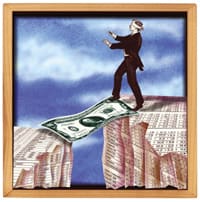Street Sense The fundamentals of stock market investing
"I Believe in the Market" -- Not
Loss of confidence in the stock market has been so complete that it will take years for investors to trust it again.

BY JERRY HELZNER
A stock brokerage firm has recently been running a series of TV commercials in which successful-looking men and women peer directly into the camera and say the following words: "I believe in the market. I believe in me."
To those individuals, all I have to say is "Oh, yeah?"
In reality, 2002 was the year in which millions of Americans finally decided that they didn't believe in the market at all. They may have been burned a bit in stocks in 2000 and lost more money in the market in 2001, but it wasn't until 2002 that they totally lost confidence in the wealth-building power of common stock ownership.
And who can blame them?
In this month's column, I'll discuss how loss of investor confidence has affected stock market prices and how long it might take for investors to regain their trust in stock investing.

WHY CONFIDENCE WAS LOST
Confidence is essentially a state of mind, and a fragile one at that. Most investors were able to accept the periodic ups and downs of the stock market as long as they were able to maintain their confidence that the market was a good place to be for the long term.
In the past, investors tended to ascribe market slumps to such factors as the business cycle, changes in interest rates, oil price shocks and other short-term events that didn't affect the underlying value of their holdings. This mindset allowed investors to not only hold on to the stocks they had, but also to buy more shares at what they felt were bargain prices.
But recently, investors have begun to raise questions they never even thought of before. They now question both the honesty of corporate managers and the accuracy of the earnings that these managers report. They also question the motives of accountants who sign off on company earnings, and the veracity of securities analysts who recommend specific stocks.
It's not investor paranoia that's causing these doubts. Given the truly outrageous level of corporate criminality that's come to light in the past year, investors have come to believe that no company is totally immune from the potential for scandal. Why hold onto stocks in this environment if you're a headline away from seeing the value of a company's shares cut in half, or even totally disappear?
FEAR LEADS TO OPPORTUNITY
If we're rational investors, we also know that there will come a time, and perhaps very soon, when the stock market will again offer us real bargains. What types of stocks will provide both safety and the opportunity for solid financial gains?
Investors who don't trust the overall market but who still want to pick up bargain-priced stocks can have the most confidence in the biggest and best companies in the most predictable industries.
Companies such as ExxonMobil, Merck, Wal-Mart and Pfizer have stood the test of time. They're much less likely to be touched by scandal than an upstart company with a dominant CEO, a weak board of directors and few internal controls. You can also have some confidence in companies with a long history of paying cash dividends. Regular dividends from an ExxonMobil or Merck offer at least some payback on your investment, even if the stock doesn't begin moving up shortly after you purchase it.
REBUILDING CONFIDENCE
But the potential for bargains won't entice most people back into stocks. Years of reform and honest corporate governance will be needed before investors again begin to have trust in the stock market.
Ophthalmology Management Associate Editor Jerry Helzner has written more than 50 articles on stock investing for Barron's. He has been a regular stock market columnist for other business publications and was a member of the equity research department of a major regional brokerage firm.








